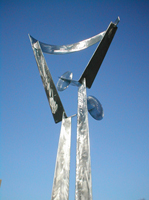
Bryn Mawr College

 |
Center Bryn Mawr College | 
|
March 27
Xenia Morin (Keck Fellow, Chemistry)
Scientific Cultures at my House: Academic vs. Industrial Life Sciences
Xenia began our discussion by first asking what "scientific culture" looks like at Bryn Mawr, and then suggesting that there was "much more mixing here," both within departments and between corridors, than at research institutions. Teaching in a small college forces us to go "outside where we are on a regular basis." Xenia characterized the scientific culture here as a "family business," like "setting up a storefront in a mall," in comparison with the "tribalism" of subdisciplines at large universities.
There is, however, a third path that our students can take: during the past fifteen years a strong industrial science culture has developed, which offers significantly higher financial remuneration and resources than does academia. Too many Ph.D.s are being produced for academic jobs; the numbers who graduate exceed the available academic employment opportunities by 1500-3000/year. The increased pressure on the sources of funds exacerbates the "tournament model" (in which a tenure track job is the "tournament prize"), with the reality of getting such a job steadily diminishing. Accordingly, the number of science Ph.D.s going into academia has decreased during the past ten years, while those choosing jobs in industry have increased. The federal government is the major funder of scientific research, which also feeds the tournament model. (For further information about "Competition and Careers in Biosciences," see Science 294 (December 14, 2001: 2293-2294.)
If graduating students conclude that they will be better off working in industry, that still does not solve the "value problem." The academic and industrial sciences are two distinctly different cultures with different age distributions, different reward systems and different attitudes to both people and time. Industry is both more results-oriented and more financially driven. But academia still provides the "on- ramp" for students going into scientific careers: what values should we be passing on to them? Our teaching practices have not changed to keep up with the changing job market. Industry taps into academic world to extract its expertise; do we want it to extract our culture as well?
In industry, resources are marshalled to pursue identified targets; goals are not defined by the curiosity of the researchers, but are chosen for their money-making capacities, although socially responsible goals and making money need not be mutually exclusive. The significant number of think tanks which funded non-targeted research twenty to thirty years ago have notably diminished. There was considerable agreement that intellectual curiosity did not function as an independent value in industry; it was even claimed that the way research was supported in the commercial world could no longer be called science, that what happens in industrial science is fundamentally different than what should go on in academic science. A metaphor was offered to describe the situation: no one objects when the supermall flourishes--until the downtown crashes. Should we be concerned about what is happening in industry ("the supermall") because it is having an effect on our own work "downtown"? The increasing insistence on payoffs within a short time span has made the practice of science more difficult for anyone invested in unfettered inquiry.
A counter-claim was lodged that the notion of "independent inquiry" was deeply nostalgic and false: universities were never created for, or operated on, altruistic premises, but clearly had their origins in economics. (The 1991 Iraq conflict looked consensus driven, but the "gloves are off" in the current war; likewise, the "community of independent scholars" never held water as an idea; the gloves are now off.) But what is free unfettered inquiry? Isn't the dicotomy between money and intellectual curiosity a false one? There is no value-free thought. We have, in our discussion, polarized various myths of how we do science.
This conversation has continued on the On-Line Forum and will resume in person next Thursday, April 3, when Yutian Wong, a Mellon Fellow in the Dance Program, will give a presentation on "Dancing Bodies, Pedagogy and Technology."
Home
| Calendar | About
| Getting Involved
| Groups | Initiatives | Bryn Mawr Home | Serendip Home
Director: Liz McCormack -
emccorma@brynmawr.edu
| Faculty Steering Committee
| Secretary: Lisa Kolonay
© 1994-
, by Center for Science in Society, Bryn Mawr College and Serendip
Last Modified:
Wednesday, 02-May-2018 11:57:05 CDT